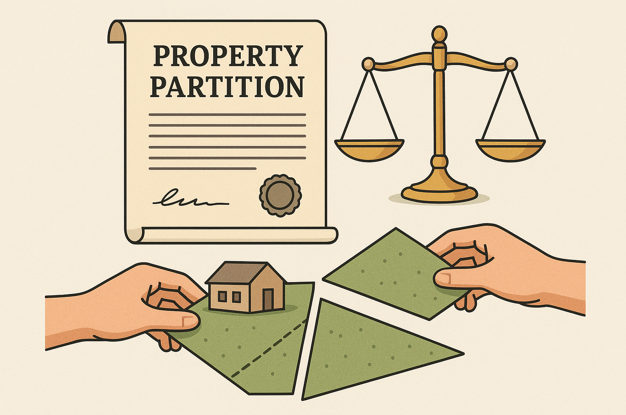By Fathom Legal Advocates and Corporate Consultants

Disputes over ancestral or jointly owned family property are among the most common legal issues in India. Many people assume that the only way to resolve such issues is through lengthy and emotionally draining court battles. But the good news is — yes, partition of family property without going to court is absolutely possible in India, provided there is mutual agreement.
Here’s how you can legally divide family property outside of the courtroom, saving both time and relationships.
1. Understand What Is Meant by Partition Partition refers to the division of jointly held property typically among family members such that each person receives a legally recognized and physically identifiable share. After partition, each co-owner becomes the absolute owner of their portion and can sell, gift, or bequeath it independently.
2. Use a Registered Partition Deed A Partition Deed is the most formal and legally binding method to divide property amicably. All co-owners must sign this document, and it should:
- Describe the property and its location
- Clearly state each person’s share
- Include mutual consent of all parties
Importantly, the Partition Deed must be registered at the local Sub-Registrar’s office and stamp duty must be paid (which varies by state).
3. Family Settlement Agreement: A Flexible Option A Family Settlement Agreement is a less formal but equally valid route. It is a mutual agreement between family members to divide property, and:
- It does not require registration if executed on plain paper
- Is based on oral or written mutual understanding
- Can cover multiple properties or business assets
Courts have held such agreements as legally valid if:
- There is no fraud, coercion or undue influence
- All parties are aware of the terms and have signed willingly
- It is properly documented with clear consent
Though registration is not mandatory, getting the agreement notarized and stamped helps prove its authenticity in case of future disputes.
4. When Is Court Intervention Necessary? You only need to go to court if:
- There’s disagreement among heirs
- Someone refuses to part with possession
- A co-owner challenges the share division
- There are disputes over authenticity of documents
In such cases, a partition suit in civil court is the only remedy. The court will then appoint a commissioner, verify documents, and pass a decree outlining each person’s legal share.
5. What About Oral Partition? Indian courts have recognized oral partitions in limited cases — especially within Hindu Undivided Families (HUFs). But proving an oral partition requires strong evidence like:
- Mutation entries
- Tax records
- Witness testimonies
To avoid uncertainty, a written agreement is always safer.
6. Stamp Duty and Tax Considerations
- Stamp Duty on a Partition Deed differs by state, typically around 1–3% of the property value.
- A Family Settlement Agreement usually attracts nominal or no stamp duty.
- Capital Gains Tax is not applicable when property is divided under inheritance or family settlement.
Always consult a tax professional or lawyer to avoid unexpected liabilities.
7. Mutation of Records Post-Partition Once partition is completed, apply for mutation of the property records at the local municipal or revenue office. This updates government records to reflect the new ownership pattern. You’ll need:
- Copy of Partition Deed or Agreement
- Property tax receipts
- ID/address proofs
Mutation is essential to avoid future claims or confusion.
8. Role of Legal Heirs and Minor Children If one of the legal heirs is a minor, the partition must be approved by the court to ensure their interests are protected. Additionally, all legal heirs including daughters have equal rights under the Hindu Succession Act, 1956 (as amended).
9. Precautions for Smooth Partition
- Make a list of all properties involved
- Clarify whether the property is self-acquired, ancestral, or jointly purchased
- Ensure all legal heirs are party to the agreement
- Seek independent legal advice to avoid future invalidation
At Fathom Legal Advocates and Corporate Consultants, we assist families in navigating peaceful property division through Partition Deeds and Family Settlement Agreements. We ensure the process is legally sound, tax-efficient, and stress-free, helping avoid long-drawn litigation.
Conclusion:
A peaceful partition of family property is not only possible but often preferable. With mutual consent and proper documentationlike Partition Deeds or Family Settlement Agreements, families can avoid the emotional and financial costs of court battles. At Fathom Legal, we help families find structured, amicable, and lawful solutions for dividing property without litigation.
If you’re looking to divide family property without going to court, connect with us at www.fathomlegal.com for practical legal support.


Leave a Comment